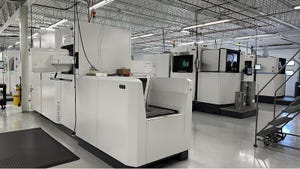July 12, 2010

In theglobal race to develop sustainable feedstocks that replace petrochemicals, aMinnesota company is quietly pounding a major stake in the ground.
Segetis, founded in2007, has developed new-to-the-world molecules based on levulinic acid estersmade from corn cobs and bio-based hydroxyl compounds.
The newchemical building blocks are called levulinic ketals and can be used to make avariety of products, including solvents, plasticizers and polyols forpolyurethane foams.
"We expectto have commercial products in each of those groups by the end of 2011," says SnehalDesai, business vice president at Segetis.
New Bio Chemicals Target Phthalate Plasticizer Replacement_A |
Drum loadsof monomers are now being delivered to development partners from a semi-worksproduction facility built in Minneapolis in 2009. Capacity at the plant is250,000 pounds per year. Segetis has commissioned construction of a tollmanufacturing plant in the Midwest that will be online early next year.Commercial products will enter the market, starting with solvents. Polyols willbe last because of significant functional testing requirements.
For now, Segetisis sourcing levulinic acid from China, but longer term the company may use woodresidue from pulp and paper production as a feedstock.
In April,PolyOne Corp., a major compounder, announced an agreement with Segetis toexplore the development of bio-derived plasticizers for use in bio-basedpolymers. Another potential outcome could be the replacement of phthalateplasticizers which make PVC and other plastics flexible. Two specific types ofphthalate plasticizers have been under fire over concerns about exposure tochildren. "We are working on a straight-up replacement of phthalates in PVC,"says Desai. One advantage of the ketal monomers is that they appear to attachfirmly to the PVC molecule. Another is their all-natural origins.
Anothermajor opportunity for the new chemistry is the manufacture of polyols whichcombine with iscoyanates to produce polyurethane.
"The polyolsmade from our ketals have an inherent rigidity in their backbone structure,"says Desai. "As a result it is possible to reduce the isocyanate levels toobtain similar levels of properties. So the use of our monomers is as much aperformance play as it is a carbon footprint play."
Use ofagricultural feedstocks has been a hot storyin polyurethane foams for the past two years.
There aremore than two million Ford vehicles on the road today with bio foam content.Ford's use of bio foam has helped the company reduce its petroleum oil usage bymore than three million pounds annually and carbon dioxide emissions by 11million pounds. Ford's biofoam is based on soy feedstock in a program partiallyfunded by the United Soybean Board, a U.S. farmer-led organization.
Soy-basedfoam reportedly costs less than petrochemical-based foam, helping fuel theexplosion in its use the past two years.
Desai saysthe polyols produced by Segetis are expected to cost about the same as polyolsmade from petroleum resources. But the economics for formulators will beimproved through reduced use of isocyanates. "We believe there is a total costpicture that is favorable for the ketal chemistry," says Desai.
Segetis wasfounded by Sergey and Olga Selifonov, a Russian couple now living in theMinneapolis area.
Theirpatents disclose a series of glycerol-derived compounds that are based on theformation of a ketal with the ketone group of levulinic acid.Glycerol-levulinate ketal compounds can be produced by reacting approximatelyone molar equivalent of glycerol with approximately one molar equivalent oflevulinic acid in the presence of an acid catalyst, and under conditionsallowing for removal of water, typically by distillation.
Theirprocess is less costly than some competing bioplastic processes that requirefermentation.
Longer range, Segetis may attempt to developother plastics with its monomer technology. For example, levulinic acid is apotential precursor to polyamide-like polymers and synthetic rubbers. One ofthe investors in Segetis is DSM, a Dutch producer of polyamides (nylons) andother high-performance plastics.
About the Author(s)
You May Also Like






